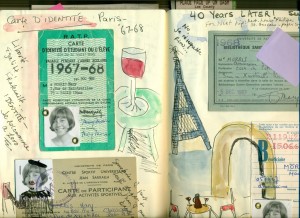
“To a man looking for fresh eyes, everything about Paris fascinates.” Brassai wrote these words in his memoir about Henry Miller, The Paris Years. Because I am heading to Paris in October, for the first time in three years, these words ring very true.
The last time I was in Paris I was in a wheelchair which I had affectionately named Duncan. Trust me it was no way to travel. Clomping along the cobbled streets and narrow sidestreets of Paris. Now I am going back to do what it was that Miller loved to do, and what Paris is one of the greatest cities in the world for. Walk.
As a girl I lived in Paris in 1967-68. It was a lonely, cold, glorious, insane time. I studied cooking and failed my French class. I lived in an old working class neighborhood with Joelle, my dear French mother, recently deceased. It was in the 13th Arrondisement. The district of Paris that Miller refers to as the most putrid, impoverished, decadent, hungry, filthy, redolent and so on neighborhoods of the entire city.
I don’t know if this is true though when I lived there it was a solid working class neighborhood with shift workers coming and going as I can and went from my classes.
Why Paris? Why French? Why me? When I was a girl, growing up in suburban Illinois, my mother (who had never been to Europe) began a crusade to have French taught in the public school. She believed that children in 6th or 7th grade should start learning a language and for her it was French.
My mother longed to travel. She named our dog Renoir. She had the heart for France and, I believe, if she’d been born in a different era, she would have developed a fashion line and gone to Paris all the time. Instead she was locked into girl scout meetings and Flag Day marching bands.
But she wanted me to learn French. Once a week she sent me to see Monsieur La Tate. Monsieur La Tate had a very strange, sad tic that made his head flash back and forth all the time and clearly he hadn’t seen his life’s destiny as being my instructor in rudimentary French. None the less I went. I was dutiful. And I learned.
In high school we were given an aptitude test in language. The test was weirdly administered in Kurdish. You had half an hour to memorize Kurdish grammar and vocabulary, then you took the test. In all my years of testing I never scored higher than I did on that language aptitude exam.
I went into AP French. My mother got our local school to start teaching French and in college for reasons even as I write these remain obscure (though perhaps not to Dr. Freud) I became a French scholar. A degree I would never complete at the graduate level, but still I learned.
In 1967 I sailed on the SS France. My mother stood on the dock. Before leaving me, she said, “You take yourself with you.” I arrived in Paris in time to become part of the student revolts of 1968. Paris got under my skin.
Miller understood what Paris had to offer him. He referred to the city as “mother, mistress, home and muse. As Brassai says, Miller tried to understand how Paris worked its magic on him, but the answers were “innumerable, intangible and ineffable.”
On his first trip he didn’t fall in love with the city, but when he returned for the second time the city grabbed him by the throat. He cut his writerly teeth here. After spending his days and nights in its bars and cafes, Miller wrote in “Remember to Remember”: One needs no artificial stimulation in Paris to create. The air is saturated with creation.”
Miller never read books for their meaning. He read a book because it touched something inside of him that made him think and feel and write more. Later in his life he admitted that he had read at least five thousand books in his life and perhaps fifty of them really mattered.
I picked up this Brassai book because it was sitting on my bedstand. Larry thinks he bought it at St. Marks as something good to take away with us to Paris. And I am devouring it as I would a meal. I am dogearring, underlining, making big check marks everywhere. It is becoming one of those books that matter to me.
I envy Miller. He went to Paris. He had no money, no resources, no hope and yet as he writes in the opening pages of Tropic of Cancer, “I am the happiest man alive.”
Yum, yum, yum. Delicious post.
Thank you for telling us about the Brassai book — it sounds like one I’d enjoy — and I wish you a wonderful trip to Paris next month. I haven’t been there in over 15 years, but I’ll never forget my awe at wandering through that city for the first time ;).
Paraphrasing that great jazz standard, “You don’t know what Miller’s literature is until you know the meaning of the blues…”. Him said, in the “Tropic of Cancer”, about money. But you don’t know what is to be poor, M. Morris. It’s easy to romanticize life, specially when you have a pocket full of grass… Life is more than language games, though.
one of the main reasons I love Paris is that I was able to eat everything I wanted and all that was delicious! hmm